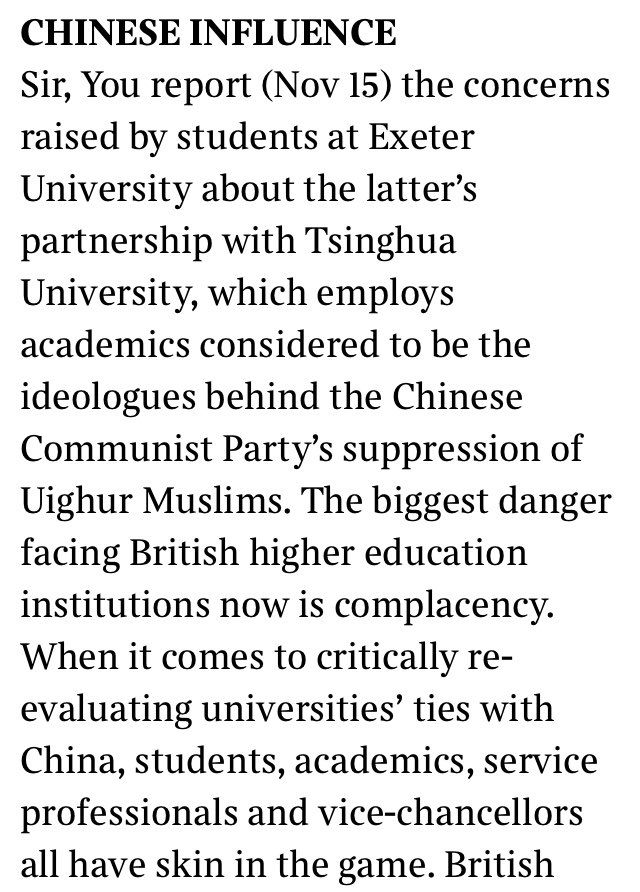
@merics_eu Director Dr. Frank N. Pieke has responded to criticism of his two op-eds for Sueddeutsche Zeitung & South China Morning Post.
His clarifications are most welcome. His open letter nevertheless includes a highly problematic paragraph /1
merics.org/en/china-flash…
His clarifications are most welcome. His open letter nevertheless includes a highly problematic paragraph /1
merics.org/en/china-flash…
@merics_eu In his open letter Pieke argues:
"We must remain very critical towards China. But such criticism must always be based on facts and should not be driven by our demand that China should conform to our expectations." /2
"We must remain very critical towards China. But such criticism must always be based on facts and should not be driven by our demand that China should conform to our expectations." /2
Pieke than goes on to claim:
"The latter [our expectations] cannot be the benchmark for policy, no matter how strongly we feel about what happens there. China has become too important to warrant such a black-or-white view." /3
"The latter [our expectations] cannot be the benchmark for policy, no matter how strongly we feel about what happens there. China has become too important to warrant such a black-or-white view." /3
There are many problems with his argument.
Let me offer some critical reflections /4
Let me offer some critical reflections /4
Pieke argues that 'we' as outsiders are perhaps being overly judgmental of what happens in mainland China.
The problem with this argument is that China is part of a global discourse in which Chinese citizens and non-Chinese citizens, elites and masses are all participating in /5
The problem with this argument is that China is part of a global discourse in which Chinese citizens and non-Chinese citizens, elites and masses are all participating in /5
For many discourse participants, China is not an academic abstraction, but a lived reality.
What happens in China has direct repercussions around the world.
So being critical of the party-state is not to be overly judgmental but a sign that 'we' actually care /6
What happens in China has direct repercussions around the world.
So being critical of the party-state is not to be overly judgmental but a sign that 'we' actually care /6
But who are 'we'?
Today's discourse about China is no longer confined to academic or policy debates.
Active citizens from around the world participate in this debate: Europeans, Americans, Hong Kongers, Taiwanese, mainland Chinese etc
Twitter is the best example /7
Today's discourse about China is no longer confined to academic or policy debates.
Active citizens from around the world participate in this debate: Europeans, Americans, Hong Kongers, Taiwanese, mainland Chinese etc
Twitter is the best example /7
To suggest that discourse participants should not be allowed to critique the arbitrary use of political power by the Chinese Communist Party based on their values and worldviews—and dare I say, ideologies—is nonsense.
That would strip discourse participants of their agency /8
That would strip discourse participants of their agency /8
I don't want to go all academic here, but for Pieke to suggest that values have no place in debates about contemporary China is just plain wrong.
Professor Nathan has rightly pointed out that "that value judgements may legitimately be made in the course of an inquiry" /9
Professor Nathan has rightly pointed out that "that value judgements may legitimately be made in the course of an inquiry" /9

There is an entire academic discourse about this fact/value dichotomy in social & political science research.
To cut a long story short: Pieke does the public discourse a disservice by suggesting that introducing values into the China debate leads to black and white views /10
To cut a long story short: Pieke does the public discourse a disservice by suggesting that introducing values into the China debate leads to black and white views /10
Epilogue: We should not accept the authority of the Chinese Communist Party & also stop normalising the party-state.
As I have argued on @LiberaleModerne the CCP is a threat to academia, not just in China, but also to academics around the world /End
libmod.de/china-wie-die-…
As I have argued on @LiberaleModerne the CCP is a threat to academia, not just in China, but also to academics around the world /End
libmod.de/china-wie-die-…
Unroll @threadreaderapp
• • •
Missing some Tweet in this thread? You can try to
force a refresh









